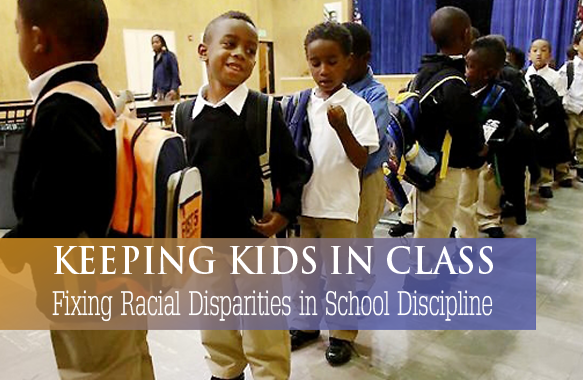Will there is a will there is a way and some school districts have each. The question is do we have the will to educate our children or do we prefer to punish them for being eager children? Might we ask ourselves do we want a disciplined child, one who has been severely rebuked for her inquisitive mind or one whose love of learning gave birth to self-discipline?
Real Discipline in School
LAST month, Maryland became one of the first states to tackle the widespread injustice of overly harsh discipline policies in our schools, adopting regulations that require an end to practices that have doubled the number of out-of-school suspensions for African-American students in the past decade.
The new regulations came just three weeks after Secretary of Education Arne Duncan and Attorney General Eric H. Holder Jr. warned school districts that a continuation of the large disparities in suspension and expulsion rates constituted a possible civil rights violation and could trigger a federal investigation.
But too many schools still use severe and ineffective practices to address student misbehavior. Large numbers of students are kicked out, typically for nonviolent offenses, and suspensions have become the go-to response for even minor misbehavior, like carrying a plastic water gun to elementary school or sometimes simply for talking back. The Civil Rights Project at U.C.L.A. found that the number of secondary school students suspended or expelled increased by some 40 percent between 1972-73 and 2009-10.
Rather than teaching kids a lesson, these practices increase dropout rates and arrest rates — with severe social and economic consequences. They also disproportionately affect students of color and students with learning disabilities. A study of nearly one million Texas students found that those suspended or expelled for violations at the discretion of school officials were almost three times as likely to be in contact with the juvenile justice system the following year.
But these patterns can be reversed, in innovative school districts and with help from teachers’ unions. We’ve seen it happen in California and Maryland, where our foundations have helped officials to change discipline policies and lower suspension rates.
In the San Francisco Bay Area, Richmond High School saw suspensions drop by 47 percent over three years when it adopted a practice, “restorative justice,” which brings together all involved parties to discuss what happened and why, and to develop a way to make amends.
At Garfield High School in East Los Angeles, teachers and administrators saw reinvigorated student governance, brought parents into the school as extra hands and eyes for critical parts of the day, and instituted after-school detention, drug counseling and conflict-resolution training. Suspensions plummeted, from 510 in 2008-9 to just 2 in the last two years. The result of these and other discipline reforms in California was a 14 percent drop in suspensions and a 12 percent decrease in expulsions for the 2012-13 school year.
Similarly, in Baltimore, local activists worked with the school district to revise its code of conduct. The new code included graduated consequences that increased with the age of the child, incidents of misbehavior and the nature of the offense.
Baltimore schools have instituted other alternative programs, and administrators have been trained to routinely check to make sure that non-classroom areas, including the bus stop outside, are safe.
Smart thinking about the lives students lead has also helped head off misbehavior. One principal of a Baltimore school with a dress code installed a washer and dryer in the building so that students without access to laundries could be assured of having clean khakis and button-down shirts, and not avoid school.
The result of these reforms has been a dramatic reduction in total suspensions in Baltimore schools (8,620 in 2012-13, down from 16,739 in 2006-7). Dropout rates for African-American boys decreased by 59 percent; graduation rates for that group increased by 16 percent.
Improving school climates lessens the need for suspensions and expulsions and creates an atmosphere more conducive to learning. Education, law-enforcement and government leaders should follow the example of Richmond, Calif., Baltimore and other cities, like Denver, where the public schools and the police department negotiated an agreement defining what police officers in schools can and can’t do, and Los Angeles, which has banned suspensions for “willful defiance.” They should look to groups like the Chicago Teachers Union, which has consistently pushed for positive alternatives to overly harsh discipline policies.
Ultimately, full-scale change requires giving teachers the tools and resources to effectively manage their classrooms. It also means ensuring that students are not victims of the kind of stereotyping or racial bias that results in unfair punishments. As a nation, we need to embrace the reforms, both large and small, that keep students in school learning rather than out of school misbehaving.
Robert K. Ross is president and chief executive of the California Endowment. Kenneth H. Zimmerman is director of United States programs for the Open Society Foundations.












Leave A Comment